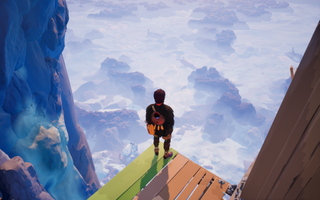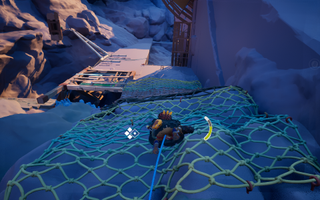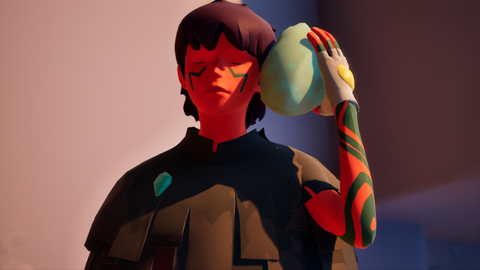Our Verdict
A subtle and intriguing story encourages you to climb ever higher in this melancholy adventure.
PC Gamer's got your back
What is it? A gorgeous vertical platformer following in the footsteps of Journey and Abzu, with a dash of Grow Home.
Release date October 31, 2023
Expect to pay $24/£22.50
Developer DON'T NOD
Publisher DON'T NOD
Reviewed on Steam Deck
Steam Deck Playable
Link Official site
I let the tension of my rope catch me like a lover, holding me in place as I rest my arms and legs, which are screaming from the exertion of carrying me up the sheer rock face. Just above me, my last piton creaks as it keeps my weight pinned to the world against gravity’s wishes. Salt wind whipped up from what was once a vast ocean floor stings my cheek. I’ve never felt more safe than I am now.
This is Jusant, and it is sublime: an incredible rock climbing game with easy-to-grasp mechanics (pun intended), a forgiving stamina system, no fiddly skill trees or item durability, and a compelling narrative that gently weaves its way through your journey through environmental storytelling and discovery. It isn’t a completely perfect experience, but its meditative simplicity and clean presentation make Jusant a standout game, even this far into a year already packed with memorable releases.

Jusant is primarily a climbing game, with elements that put me in mind of 2015's Grow Home, but it also shares a lot of conceptual DNA with games like The Pathless, Abzu and Journey; exploration-focused titles set in mysterious, broken worlds. You play a young climber carrying an infant “ballast,” a creature akin to a flying whale with the power to restore water to the wastelands that have been dehydrated by a strange, possibly astronomical phenomenon called the “Jusant”. (That's French for “receding tide,” according to the devs.) As we make our way up the vertical cliff-face that comprises 90% of the mysterious tower at the center of the game’s world, we encounter the last remnants of the different civilizations that called it home, pre-Jusant.
The climbing itself is simple enough, on paper: use the bottom shoulder buttons on a controller (which the game recommends) to climb and hold onto vertical surfaces, and use the top shoulder buttons to reel your rope in and out. Use the left face button to place a piton, and the right face button to remove it; the bottom face button is to climb onto flat ground from a ledge and jump when you need to. The game feeds all of this to you quickly and easily in its opening level, and then the real challenge begins: how do you combine all of these exceptionally simple actions in such a way that you can effectively climb anywhere you want?
Luckily Jusant isn’t interested in having players beat their heads against any particular section of the tower. The game realistically demonstrates the strain of climbing through its mechanics, as every action you take, from simply reaching to the next graspable object to jumping up the cliff face, takes a chunk out of your climber’s stamina. But even if your stamina fall to zero, you simply fall back to the last place your carabiner was anchored. Your climber can regain some stamina lost by resting at various points on their climb, and they can create subsequent anchor points with their three pitons, like miniature checkpoints. There’s no fall damage to be concerned with, so your focus can remain at all times on the climb ahead. Coupled with your ballast’s abilities—to make climbable plants grow and find the next objectives, namely—you can feel that Jusant wants you to make this climb, and to hopefully enjoy yourself along the way.

Most of what I learn about each area of the tower that I pass through comes from letters detailing the daily lives and normal hopes and fears of the people who once lived here.
There are many mysteries that present themselves upon immediately embarking on your journey in Jusant. Some of these are basic: who are you? What are ballasts? What are we doing here? And other questions are more complex, or don’t necessarily have satisfying answers: What is the “Jusant?” What is this massive tower I'm supposed to climb? Who or what made it? What am I even doing here? Your immediate impulse might be to try and scour the environment for answers, but the game has other plans. It simply wants you to climb. Answers will present themselves the higher up you go.
Most of what I learn about each area of the tower that I pass through comes from letters detailing the daily lives and normal hopes and fears of the people who once lived here. Through shells I find scattered around, I can imagine the sounds of the people’s activities; as I complete unfinished cairns I find in certain areas, I can honor the civilizations that passed on; with each new piece of wall art I come across, my understanding of the importance of the ballasts grows. One set of letters is different from the others: the logbook pages written by Bianca, another young climber from the first level of the tower who went on one of the final expeditions to the top. Through her, I have a journey to mirror my own. What choices will I make that she didn’t?
Coming in at six chapters with four levels of the tower to make your way through, each with their own real world architectural references and environmental challenges, Jusant doesn’t linger too long as an experience. What might linger are the questions it poses and a possible future it presents. The game leaves a lot open to interpretation, and while there are letters and logs to collect, they define a breakdown in communication and a loss of knowledge and history rather than any concrete answers. Notes scrawled to friends and family and never answered, journal entries describing evacuations, newspapers shutting down operations—and eventually nothing is left but us. Will we succeed? That’s for you to find out. Happy climbing.
A subtle and intriguing story encourages you to climb ever higher in this melancholy adventure.

